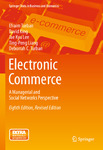| dc.description.abstract | There has been a severe recession in the world economy in recent years, yet
electronic commerce, the topic of this book, has grown rapidly, with companies
like Facebook, Google, Pinterest, Alibaba Group and Amazon.com setting
new levels of performance every year.
Electronic commerce (EC) is a business model in which transactions take
place over electronic networks, mostly the Internet. It includes the process of
electronically buying and selling goods, services, and information. Certain
EC applications, such as buying and selling stocks and airline tickets online,
are reaching maturity, some even exceeding non-Internet trade volumes.
However, EC is not just about buying and selling; it also is about electronically
communicating, collaborating, and discovering information. It is about
e-learning, customer service, e-government, social networks, and much more.
EC is having an impact on a signifi cant portion of the world, affecting businesses,
professions, trade, and of course, people.
The most important developments in EC since 2012 are the phenomenal
growth of social networks, especially Facebook, Google+, and Twitter, and the
trend toward conducting EC via mobile devices. Other major developments
are the global expansion of EC, especially in China, where you can fi nd the
world’s largest EC company. In addition, some emerging EC business models
are changing industries (e.g., travel, banking, fashion, and transportation).
In the 8th edition, we bring forth the latest trends in e-commerce, including
social businesses, social networking, social collaboration, innovations,
and mobility.
Note: Portions of this book were previously published by: Pearson
Education, Inc. under the title: Electronic Commerce 2012: A Managerial
and Social Networks Perspective. | en_US |

